Suntribe was an Estonian girl group that participated in the 50th Eurovision Song Contest in 2005. The original line-up was Mari-Leen Kaselaan, Rebecca Kontus, Laura Põldvere and Jaanika Vilipo. They were later joined by a fifth member, Daana Ots.
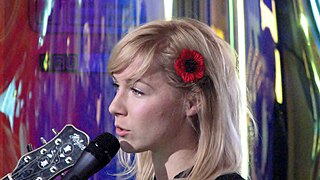
Lenna Kuurmaa is an Estonian singer-songwriter and actress. She is a member of the girl group Vanilla Ninja, but after the band's hiatus since 2009, continued to work as a solo-artist. She also formed a band with the name "Lenna" who released the debut album Lenna in June 2010.

Estonia has participated in the Eurovision Song Contest 28 times since making its debut in 1994. Its first appearance would have taken place in 1993 but a qualification round was installed for seven former Eastern Bloc countries hoping to make their debut in the contest, with Estonia failing to qualify. Estonia has won the contest once, in 2001.
Estonia participated in the Eurovision Song Contest 2007 with the song "Partners in Crime" written by Berit Veiber and Hendrik Sal-Saller. The song was performed by Gerli Padar. The Estonian broadcaster Eesti Televisioon (ETV) organised the national final Eurolaul 2007 in order to select the Estonian entry for the 2007 contest in Helsinki, Finland. Ten songs competed in the national final and the winner was selected over two rounds of public voting. In the first round, the top three were selected to qualify to the superfinal. In the superfinal, "Partners in Crime" performed by Gerli Padar was selected as the winner.
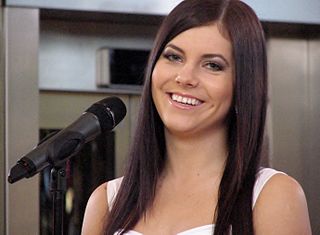
Birgit Sarrap, also known mononymously as Birgit, is an Estonian singer. She rose to prominence in 2007 after winning the first season of Eesti otsib superstaari, the Estonian version of Idol. Her debut self-titled studio album was later released in 2008. Birgit has gone on to release four other studio albums in her career.
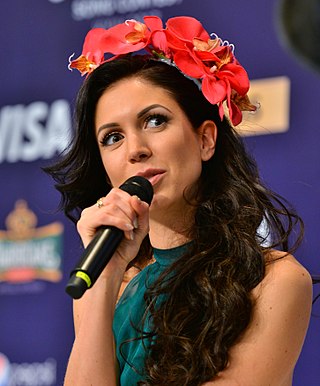
Laura Põldvere sometimes known professionally as simply Laura, is an Estonian singer. She is said to be the most played Estonian artist on Estonian radio in the past decade. She is internationally known for representing Estonia in the Eurovision Song Contest 2005 as part of the girl group Suntribe and did so again in 2017 in a duet with Koit Toome, singing "Verona."
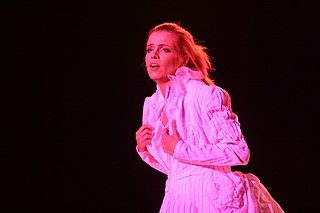
Nele-Liis Vaiksoo is an Estonian singer and actress, known for her work in musical theatre.

Luisa Rõivas is an Estonian singer and politician.
Estonia participated in the Eurovision Song Contest 2009 with the song "Rändajad" written by Sven Lõhmus. The song was performed by the group Urban Symphony. The Estonian broadcaster Eesti Rahvusringhääling (ERR) organised the national final Eesti Laul 2009 in order to select the Estonian entry for the 2009 contest in Moscow, Russia. Ten songs competed in the national final and the winner was selected over two rounds of voting. In the first round, a jury panel and a public vote selected the top two to qualify to the superfinal. In the superfinal, "Rändajad" performed by Urban Symphony was selected as the winner entirely by a public vote.

Dagmar Oja is an Estonian singer.
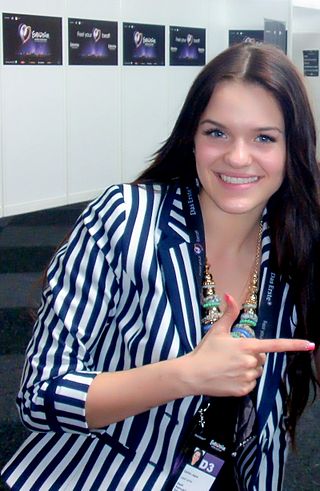
Getter Jaani is an Estonian singer and actress. She represented Estonia in the Eurovision Song Contest 2011 with the song "Rockefeller Street".

Sven Lõhmus is an Estonian pop-composer, lyricist, and producer at Moonwalk Studios, a music company featuring Estonian artists.

Tatjana Mihhailova-Saar, better known as Tanja or Tanja Mihhailova is a Russian-Estonian pop singer and actress. She was born in Kaliningrad, Russia, and has lived in Estonia from a very young age. Tanja has been a member of several bands in her professional career and has performed in several stage musicals. She represented Estonia in the Eurovision Song Contest 2014 with the song "Amazing" and finished in 12th place in the semi-final, failing to qualify.
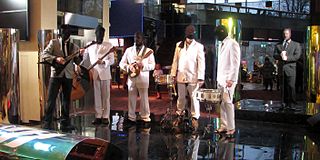
Winny Puhh is an Estonian metal/punk band formed in 1993 in Põlva. The founding members, Ove, Indrek, and Olavi knew each other from school. In 2009, the drummer Olavi Sander (Olevik) temporarily left the band and was replaced by Kristjan (Väikepax). Later however Olevik returned and the band has two drummers now. Many of their performances involve costumes.
Estonia participated in the Eurovision Song Contest 2017 with the song "Verona" written by Sven Lõhmus. The song was performed by Koit Toome, who had previously represented Estonia in the Eurovision Song Contest in 1998 where he placed twelfth with the song "Mere lapsed", and Laura, who had previously represented Estonia in the Eurovision Song Contest in 2005 as part of the group Suntribe where she failed to qualify to the final with the song "Let's Get Loud". The Estonian broadcaster Eesti Rahvusringhääling (ERR) organised the national final Eesti Laul 2017 in order to select the Estonian entry for the 2017 contest in Kyiv, Ukraine. The national final consisted of three shows: two semi-finals and a final. Ten songs competed in each semi-final and five from each semi-final as determined by a jury panel and public vote qualified to the final. In the final, the winner was selected over two rounds of voting. In the first round, a jury panel and a public vote selected the top three to qualify to the super final. In the super final, "Verona" performed by Koit Toome and Laura was selected as the winner entirely by a public vote.

"Verona" is an English-language song performed by Estonian singers Koit Toome and Laura.
Estonia participated in the Eurovision Song Contest 2018 with the song "La forza" written by Mihkel Mattisen, Timo Vendt, Ksenia Kuchukova and Elina Nechayeva. The song was performed by Elina Nechayeva. The Estonian broadcaster Eesti Rahvusringhääling (ERR) organised the national final Eesti Laul 2018 in order to select the Estonian entry for the 2018 contest in Lisbon, Portugal. The national final consisted of three shows: two semi-finals and a final. Ten songs competed in each semi-final and five from each semi-final as determined by a jury panel and public vote qualified to the final. In the final, the winner was selected over two rounds of voting. In the first round, a jury panel and a public vote selected the top three to qualify to the superfinal. In the superfinal, "La forza" performed by Elina Nechayeva was selected as the winner entirely by a public vote.
"Spirit Animal" is a song performed by Estonian singer Kerli. It was released as a standalone single on December 19, 2016, prior to being performed at Eesti Laul 2017, Estonia's pre-selection for the Eurovision Song Contest 2017.
Estonia originally planned to participate in the Eurovision Song Contest 2020 with the song "What Love Is" written by Uku Suviste and Sharon Vaughn. The song was performed by Uku Suviste. The Estonian broadcaster Eesti Rahvusringhääling (ERR) organised the national final Eesti Laul 2020 in order to select the Estonian entry for the 2020 contest in Rotterdam, Netherlands. The national final consisted of three shows: two semi-finals and a final. Twelve songs competed in each semi-final and six from each semi-final as determined by a jury panel and public vote qualified to the final. In the final, the winner was selected over two rounds of voting. In the first round, a jury panel and a public vote selected the top three to qualify to the superfinal. In the superfinal, "What Love Is" performed by Uku Suviste was selected as the winner entirely by a public vote.
Estonia participated in the Eurovision Song Contest 2021 with the song "The Lucky One" written by Uku Suviste and Sharon Vaughn. The song was performed by Uku Suviste. The Estonian broadcaster Eesti Rahvusringhääling (ERR) organised the national final Eesti Laul 2021 in order to select the Estonian entry for the 2021 contest in Rotterdam, Netherlands. The national final consisted of three shows: two semi-finals and a final. Twelve songs competed in each semi-final and six from each semi-final as determined by a jury panel and public vote qualified to the final. In the final, the winner was selected over two rounds of voting. In the first round, a jury panel and a public vote selected the top three to qualify to the superfinal. In the superfinal, "The Lucky One" performed by Uku Suviste was selected as the winner entirely by a public vote.













